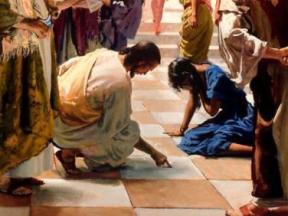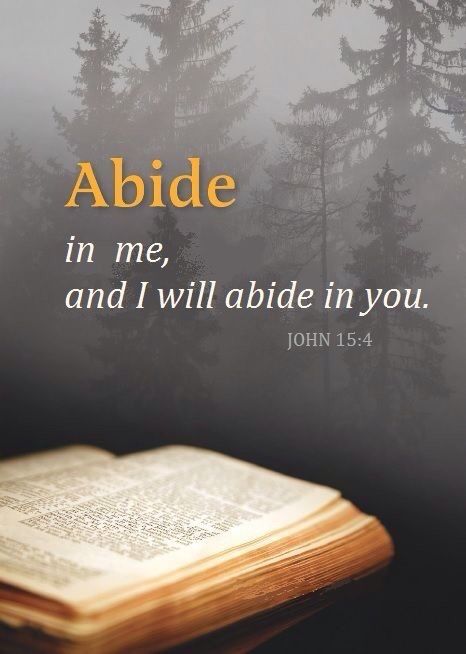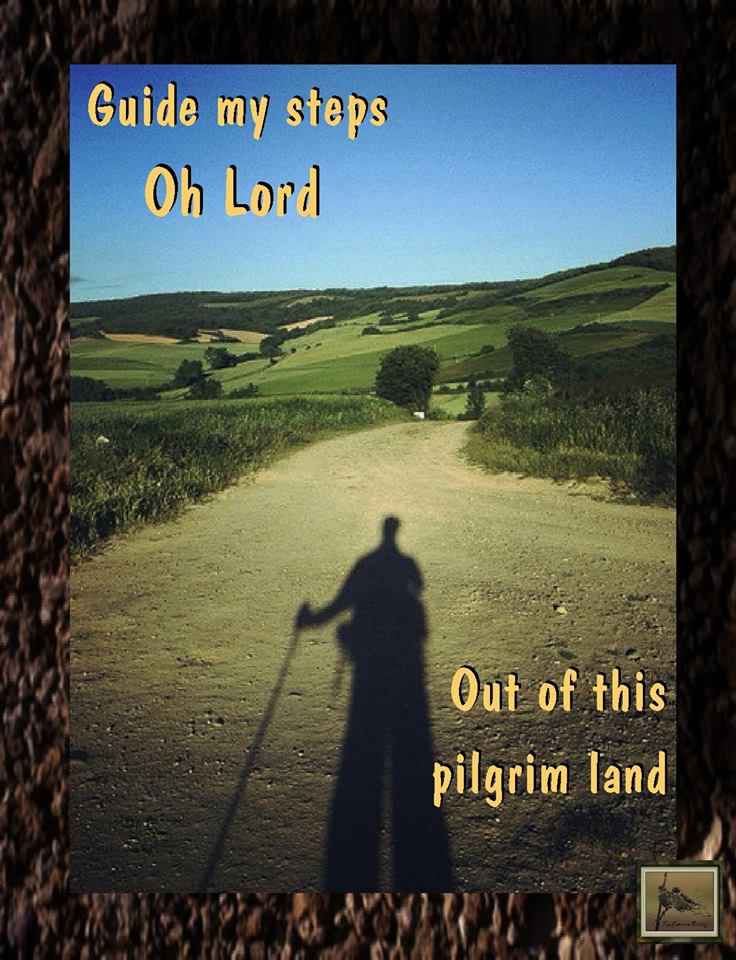THE WOMAN TAKEN IN ADULTERY
Joh 8:3 And the scribes and Pharisees brought unto him a woman taken in adultery; and when they had set her in the midst,
Joh 8:4 They say unto him, Master, this woman was taken in adultery, in the very act.
Joh 8:5 Now Moses in the law commanded us, that such should be stoned: but what sayest thou?
Joh 8:6 This they said, tempting him, that they might have to accuse him. But Jesus stooped down, and with his finger wrote on the ground, as though he heard them not.
Joh 8:7 So when they continued asking him, he lifted up himself, and said unto them, He that is without sin among you, let him first cast a stone at her.
Joh 8:8 And again he stooped down, and wrote on the ground.
Joh 8:9 And they which heard it, being convicted by their own conscience, went out one by one, beginning at the eldest, even unto the last: and Jesus was left alone, and the woman standing in the midst.
Joh 8:4 They say unto him, Master, this woman was taken in adultery, in the very act.
Joh 8:5 Now Moses in the law commanded us, that such should be stoned: but what sayest thou?
Joh 8:6 This they said, tempting him, that they might have to accuse him. But Jesus stooped down, and with his finger wrote on the ground, as though he heard them not.
Joh 8:7 So when they continued asking him, he lifted up himself, and said unto them, He that is without sin among you, let him first cast a stone at her.
Joh 8:8 And again he stooped down, and wrote on the ground.
Joh 8:9 And they which heard it, being convicted by their own conscience, went out one by one, beginning at the eldest, even unto the last: and Jesus was left alone, and the woman standing in the midst.
THE ACCUSERS SELF-CONDEMNED
A woman is brought to Jesus, caught in the act of adultery.
A woman is brought to Jesus, caught in the act of adultery.
And everyone went to his own house. But Jesus went to the Mount of Olives. Now early in the morning He came again into the temple, and all the people came to Him; and He sat down and taught them. Then the scribes and Pharisees brought to Him a woman caught in adultery. And when they had set her in the midst, they said to Him, “Teacher, this woman was caught in adultery, in the very act. Now Moses, in the law, commanded us that such should be stoned. But what do You say?” This they said, testing Him, that they might have something of which to accuse Him.
a. Brought to Him a woman caught in adultery: They set a trap for Jesus. If Jesus says, “Let her go,” then it seems that He breaks the Mosaic Law. If he says, “Execute her for the crime of adultery,” then Jesus seems harsh and He breaks Roman law, because the Romans had taken away the right of Jews to officially execute people for religious offenses.
b. Moses, in the law, commanded us that such should be stoned: Did they really execute people for adultery in Israel? It is true that adultery was a capital offense under Jewish law, but the rules for evidence in capital cases were extremely strict. The actual act had to be observed by multiple witnesses who agreed exactly in their testimony. So, as a practical matter, virtually no one was executed for adultery, since this is a private sin.
c. This they said, testing Him, that they might have something of which to accuse Him: These wretched men used this woman as a weapon against Jesus.
i. They cared nothing for true righteousness, for it is evident that they set her up. They claim that this woman was caught in adultery, in the very act - yet they do not bring the guilty man before Jesus. It’s possible that the man was one of their own number, and was simply setting the woman up as a pawn in their conflict with Jesus.
ii. They see clearly the sin in others, but are blind to the sin in themselves.
3. (Joh_8:6 b) Jesus ignores them, as if He never heard them.
But Jesus stooped down and wrote on the ground with His finger, as though He did not hear.
a. As though He did not hear: Why did Jesus ignore them? Some think it was because He despised them; others say that He was embarrassed for the woman’s sake. Still others say that He was horrified at what these men did to her.
b. Wrote on the ground with His finger: What did Jesus write? No one can know for certain. He may have listed their names or their sins; or simply doodled; He may have followed Roman judicial practice and wrote out His sentence before He pronounced it.
i. Or, He may have written out a passage like Exo_23:1: Do not put your hand with the wicked to be an unrighteous witness.
When they persisted, saying, What sayest thou? he said what was an awful rebuke. They knew that he knew their lives, that they were as guilty as the woman they had brought. They forgot the demand of Moses (Deu_17:5-7) that the witnesses should cast the first stone, and his answer was like a bolt of lightning.
4. (Joh_8:7-9) Jesus passes sentence upon the woman - and her accusers.
So when they continued asking Him, He raised Himself up and said to them, “He who is without sin among you, let him throw a stone at her first.” And again He stooped down and wrote on the ground. Then those who heard it, being convicted by their conscience, went out one by one, beginning with the oldest even to the last. And Jesus was left alone, and the woman standing in the midst.
a. In Jewish law, witnesses to the capital offense began the stoning. When Jesus said, He who is without sin among you, let him throw a stone at her first, He was really said, “All right, let’s execute her. But let’s do it right. One of the witnesses has to have a hand in her execution. So who among you is the one who witnessed this crime, but only brought to Me the woman, not the man?”
i. Jesus makes it plain - whoever the witness is, whoever the one who has the right to cast the first stone is, he is as guilty as the woman taken in adultery, because of his hypocrisy.
b. Went out one by one, beginning with the oldest even to the last: Why did they leave in this order? Perhaps the oldest left first because they most easily understood that Jesus was talking about them.
i. Or, others think that Jesus was writing on the ground an account of their own sins, beginning from the oldest to the youngest, and this explains the order of their departure.
c. Being convicted by their conscience: The embarrassment was no longer His, but theirs. If anyone tries to embarrass Jesus, they will instead find themselves put to shame. (excerpt from David Guzik)
a. Brought to Him a woman caught in adultery: They set a trap for Jesus. If Jesus says, “Let her go,” then it seems that He breaks the Mosaic Law. If he says, “Execute her for the crime of adultery,” then Jesus seems harsh and He breaks Roman law, because the Romans had taken away the right of Jews to officially execute people for religious offenses.
b. Moses, in the law, commanded us that such should be stoned: Did they really execute people for adultery in Israel? It is true that adultery was a capital offense under Jewish law, but the rules for evidence in capital cases were extremely strict. The actual act had to be observed by multiple witnesses who agreed exactly in their testimony. So, as a practical matter, virtually no one was executed for adultery, since this is a private sin.
c. This they said, testing Him, that they might have something of which to accuse Him: These wretched men used this woman as a weapon against Jesus.
i. They cared nothing for true righteousness, for it is evident that they set her up. They claim that this woman was caught in adultery, in the very act - yet they do not bring the guilty man before Jesus. It’s possible that the man was one of their own number, and was simply setting the woman up as a pawn in their conflict with Jesus.
ii. They see clearly the sin in others, but are blind to the sin in themselves.
3. (Joh_8:6 b) Jesus ignores them, as if He never heard them.
But Jesus stooped down and wrote on the ground with His finger, as though He did not hear.
a. As though He did not hear: Why did Jesus ignore them? Some think it was because He despised them; others say that He was embarrassed for the woman’s sake. Still others say that He was horrified at what these men did to her.
b. Wrote on the ground with His finger: What did Jesus write? No one can know for certain. He may have listed their names or their sins; or simply doodled; He may have followed Roman judicial practice and wrote out His sentence before He pronounced it.
i. Or, He may have written out a passage like Exo_23:1: Do not put your hand with the wicked to be an unrighteous witness.
When they persisted, saying, What sayest thou? he said what was an awful rebuke. They knew that he knew their lives, that they were as guilty as the woman they had brought. They forgot the demand of Moses (Deu_17:5-7) that the witnesses should cast the first stone, and his answer was like a bolt of lightning.
4. (Joh_8:7-9) Jesus passes sentence upon the woman - and her accusers.
So when they continued asking Him, He raised Himself up and said to them, “He who is without sin among you, let him throw a stone at her first.” And again He stooped down and wrote on the ground. Then those who heard it, being convicted by their conscience, went out one by one, beginning with the oldest even to the last. And Jesus was left alone, and the woman standing in the midst.
a. In Jewish law, witnesses to the capital offense began the stoning. When Jesus said, He who is without sin among you, let him throw a stone at her first, He was really said, “All right, let’s execute her. But let’s do it right. One of the witnesses has to have a hand in her execution. So who among you is the one who witnessed this crime, but only brought to Me the woman, not the man?”
i. Jesus makes it plain - whoever the witness is, whoever the one who has the right to cast the first stone is, he is as guilty as the woman taken in adultery, because of his hypocrisy.
b. Went out one by one, beginning with the oldest even to the last: Why did they leave in this order? Perhaps the oldest left first because they most easily understood that Jesus was talking about them.
i. Or, others think that Jesus was writing on the ground an account of their own sins, beginning from the oldest to the youngest, and this explains the order of their departure.
c. Being convicted by their conscience: The embarrassment was no longer His, but theirs. If anyone tries to embarrass Jesus, they will instead find themselves put to shame. (excerpt from David Guzik)
For the Son of man is not come to destroy men's lives,
but to save them Luk 9:56
but to save them Luk 9:56
| This passage has been the subject of much controversy, but there is no possibility of accounting for it except on the supposition that this incident really took place. It reveals in our Lord’s character such tenderness, wisdom, hatred of sin, and insight into the heart of man, that it is impossible to suppose that any evangelist could have invented the story. The sinner’s way of treating sin is to regard it as “a case” for curious speculation, and an opportunity for contrasting with it the immaculate virtue of the accusers. They take prurient pleasure in enumerating the terrible details, but give no sign of pity or shame for the sinner. The Law’s way of treating sin is to stone. The executioner shows no mercy. The offender falls beneath the Law’s curse and penalty. | The Savior’s way of treating sin is to forgive. In that bowed head and hidden face, Joh_8:10, we learn how much sin costs Him. But it is easy to hear His words of forgiveness, and to go forth from His presence with the assurance that “there is now no condemnation to them that are in Christ Jesus;” but we shall never know how much sin has cost Him, whom it crucifies afresh. That silent, averted gaze has made men bow their heads and beat upon their breasts. F.B. Meyer |
Where Are Thine Accuser's?
Joh 8:10 When Jesus had lifted up himself, and saw none but the woman, he said unto her, Woman, where are those thine accusers? hath no man condemned thee?
Joh 8:11 She said, No man, Lord. And Jesus said unto her, Neither do I condemn thee: go, and sin no more.
Joh 8:10 When Jesus had lifted up himself, and saw none but the woman, he said unto her, Woman, where are those thine accusers? hath no man condemned thee?
Joh 8:11 She said, No man, Lord. And Jesus said unto her, Neither do I condemn thee: go, and sin no more.
With these words-Jesus cut the chords of the accuser's condemnation, guilt, and shame. With words of mercy, love, and grace, He opened the door of freedom, and a new beginning. He ends with a simple warning-don't return from where you came, don't repeat the sin.
The verses in Isaiah 41:10-13 can be detected in his words-though not spoken; words of comfort, strength, and the promise of His continuing care over her from this point; that she could trust in Him to undertake for her cares, needs, and deliverance.
Isa 41:10 Fear thou not; for I am with thee: be not dismayed; for I am thy God: I will strengthen thee; yea, I will help thee; yea, I will uphold thee with the right hand of my righteousness.
Isa 41:11 Behold, all they that were incensed against thee shall be ashamed and confounded: they shall be as nothing; and they that strive with thee shall perish.
Isa 41:12 Thou shalt seek them, and shalt not find them, even them that contended with thee: they that war against thee shall be as nothing, and as a thing of nought.
Isa 41:13 For I the LORD thy God will hold thy right hand, saying unto thee, Fear not; I will help thee.
Lorna Couillard
The verses in Isaiah 41:10-13 can be detected in his words-though not spoken; words of comfort, strength, and the promise of His continuing care over her from this point; that she could trust in Him to undertake for her cares, needs, and deliverance.
Isa 41:10 Fear thou not; for I am with thee: be not dismayed; for I am thy God: I will strengthen thee; yea, I will help thee; yea, I will uphold thee with the right hand of my righteousness.
Isa 41:11 Behold, all they that were incensed against thee shall be ashamed and confounded: they shall be as nothing; and they that strive with thee shall perish.
Isa 41:12 Thou shalt seek them, and shalt not find them, even them that contended with thee: they that war against thee shall be as nothing, and as a thing of nought.
Isa 41:13 For I the LORD thy God will hold thy right hand, saying unto thee, Fear not; I will help thee.
Lorna Couillard









